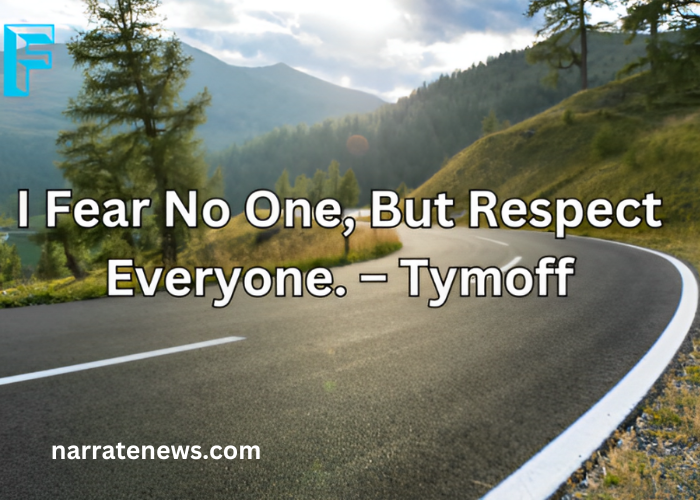
I Fear No One but Respect Everyone – Tymoff
In a world where power dynamics, ego battles, and hierarchical struggles often dictate human interactions, the statement “I fear no one but respect everyone” by Tymoff stands as a powerful manifesto for living with integrity and dignity. This principle encapsulates a profound understanding of self-worth, courage, and respect for others, transcending mere words to form a foundation for a balanced and fulfilling life. In this article, we will explore the deeper meanings of this phrase, its implications in various aspects of life, and how embracing this mindset can lead to personal growth and harmonious relationships.
Understanding Fear and Respect
To truly appreciate Tymoff’s statement, it’s essential to dissect the concepts of fear and respect. Fear is an emotion triggered by perceived danger or threat, often leading to avoidance or submissive behavior. It can stem from various sources, including physical threats, psychological manipulation, or societal pressures. In contrast, respect is a deep admiration for someone or something elicited by their abilities, qualities, or achievements. Respect is given freely and comes from a place of positive acknowledgment and valuation.
The Power of Fearlessness
“I fear no one” is a bold declaration of fearlessness. It does not imply recklessness or arrogance but a profound inner strength and self-assurance. Fearlessness comes from self-awareness and confidence, which are cultivated through personal experiences, achievements, and failures. When we say we fear no one, we are asserting that we will not allow others to intimidate us or dictate our actions. This mindset is crucial in various life situations:
- Personal Growth: Fear often holds people back from pursuing their goals or stepping out of their comfort zones. By embracing fearlessness, individuals can challenge themselves, take risks, and grow from their experiences. This growth is not only professional but also personal, leading to a more fulfilling life.
- Professional Environment: In the workplace, fearlessness can manifest as the courage to speak up, innovate, and lead. It allows individuals to navigate challenges and conflicts without succumbing to undue pressure or intimidation. This quality is especially important in leadership roles, where making tough decisions and standing by them is crucial.
- Social Interactions: Fearlessness enables individuals to maintain their authenticity in social interactions. It helps them resist peer pressure and societal norms that do not align with their values, fostering genuine relationships based on mutual respect.
The Essence of Respect
Respecting everyone, regardless of their status or relationship with us, is a testament to our humanity and ethical standards. It reflects an acknowledgment of others’ intrinsic worth and dignity. Respect is foundational to healthy and productive human interactions and manifests in various forms:
- Empathy and Compassion: Respecting others involves understanding and valuing their feelings, perspectives, and experiences. It fosters empathy and compassion, creating a supportive and nurturing environment where individuals feel heard and valued.
- Equality and Justice: Respect underpins the principles of equality and justice. It drives us to treat others fairly and without discrimination, promoting inclusive and equitable societies. In professional settings, this translates to fair treatment of colleagues and subordinates, fostering a culture of mutual respect and collaboration.
- Conflict Resolution: Respect is crucial in resolving conflicts. It encourages open communication, active listening, and finding common ground. When individuals respect each other, they are more likely to engage in constructive dialogue and seek solutions that benefit all parties involved.
Integrating Fearlessness and Respect
The interplay between fearlessness and respect is what makes Tymoff’s statement profoundly impactful. While fearlessness empowers us to stand up for ourselves and pursue our paths, respect ensures that we do so without diminishing others. This balance is essential in various domains of life:
- Leadership: Effective leaders embody both fearlessness and respect. They are confident in their decisions and vision, yet they value their team members’ contributions and treat them with dignity. This combination fosters trust, loyalty, and high morale within the team.
- Personal Relationships: In personal relationships, fearlessness allows individuals to express their true selves and set healthy boundaries. Simultaneously, respect ensures that these expressions and boundaries do not harm the other person. This balance is key to maintaining healthy, loving, and supportive relationships.
- Social Activism: Social activists often embody the spirit of fearlessness and respect. They challenge injustices and fight for change without succumbing to fear, while their respect for human rights and dignity drives their cause. This approach ensures that their activism is not only powerful but also ethical and inclusive.
Practical Steps to Embrace Fearlessness and Respect
While the idea of fearing no one and respecting everyone is noble, putting it into practice can be challenging. Here are some practical steps to integrate this mindset into daily life:
- Self-Reflection: Regular self-reflection helps build self-awareness and confidence. Understanding one’s strengths, weaknesses, values, and fears is the first step towards cultivating fearlessness.
- Mindfulness and Emotional Regulation: Practicing mindfulness can help manage fear and anxiety. Techniques such as meditation, deep breathing, and journaling can calm the mind and enhance emotional regulation, enabling individuals to respond to situations with composure and confidence.
- Continuous Learning: Continuous learning and skill development bolster confidence. By acquiring knowledge and competencies, individuals feel more equipped to face challenges and less intimidated by potential threats.
- Practice Empathy: Developing empathy involves actively listening to others, trying to understand their perspectives, and validating their feelings. This practice nurtures respect and strengthens interpersonal relationships.
- Set Boundaries: Fearlessness involves setting and maintaining boundaries to protect one’s well-being. Communicating these boundaries respectfully ensures that they are understood and honored by others.
- Engage in Constructive Dialogue: Engage in open and respectful communication, especially during conflicts. Focus on understanding the other person’s viewpoint and finding common ground rather than dominating the conversation.
The Societal Impact
If more individuals embraced the principle of fearing no one but respecting everyone, the societal impact would be profound. Communities would become more cohesive and supportive, with individuals feeling empowered and valued. Workplaces would thrive on collaboration and innovation, driven by mutual respect and fearless leadership. Social movements would gain strength and legitimacy, grounded in ethical principles and respect for human dignity.
Conclusion
Tymoff’s statement, “I fear no one but respect everyone,” is a powerful guiding principle for living a balanced and fulfilling life. It calls for an inner strength that resists intimidation and a deep respect for others’ intrinsic worth. By integrating fearlessness and respect into our daily lives, we can foster personal growth, build healthy relationships, and contribute to a more just and equitable society. This mindset is not merely aspirational but achievable through self-reflection, empathy, continuous learning, and mindful practices. Ultimately, living by this principle can transform our interactions and lead to a more harmonious and compassionate world.


